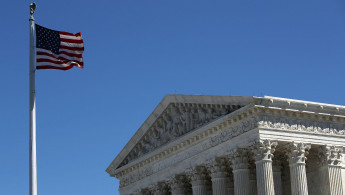US courts back victims of Iran-linked attacks
Victims and relatives affected by attacks blamed on Iran must be compensated by Tehran, US courts have ruled.
2 min read
More than 1,000 Americans are affected by the ruling [Getty]
Iran must hand over nearly $2 billion in frozen assets to survivors and relatives of those killed in attacks blamed on Tehran, the US Supreme Court ruled on Wednesday.
The ruling was upheld following a 6-2 decision in favour of victims and family members affected by several attacks that the US has linked to Iran.
This includes the 1983 bombing of a US Marine barracks in Beirut - killing 241 US troops - and the 1996 Khobar Towers bombing in Saudi Arabia - which left 19 Americans dead, along with other attacks blamed on Iran.
"We are extremely pleased with the Supreme Court's decision, which will bring long-overdue relief to more than 1,000 victims of Iranian terrorism and their families, many of whom have waited decades for redress," said Theodore Olson, a former US solicitor general who represented the relatives of the victims.
The decision affects more than a thousand Americans who are expected to receive the funds "promptly" according to Matthew McGill, a partner at Olson's firm.
"Today's decision is a long-awaited victory for justice and in recognizing that the survivors are entitled to this compensation," Senator Robert Menendez, who helped author the legislation, said in a statement.
Iran suggested the law was unconstitutional as it violated separation of powers, but federal courts rejected that claim and backed the law.
The lower courts also denied Iran's central bank's request for legal immunity, a decision backed by the Supreme Court.
The 2012 law "does not transgress constraints the Constitution places on Congress and the president", Ginsburg wrote in the majority opinion.
The ruling was upheld following a 6-2 decision in favour of victims and family members affected by several attacks that the US has linked to Iran.
This includes the 1983 bombing of a US Marine barracks in Beirut - killing 241 US troops - and the 1996 Khobar Towers bombing in Saudi Arabia - which left 19 Americans dead, along with other attacks blamed on Iran.
"We are extremely pleased with the Supreme Court's decision, which will bring long-overdue relief to more than 1,000 victims of Iranian terrorism and their families, many of whom have waited decades for redress," said Theodore Olson, a former US solicitor general who represented the relatives of the victims.
The decision affects more than a thousand Americans who are expected to receive the funds "promptly" according to Matthew McGill, a partner at Olson's firm.
"Today's decision is a long-awaited victory for justice and in recognizing that the survivors are entitled to this compensation," Senator Robert Menendez, who helped author the legislation, said in a statement.
Iran suggested the law was unconstitutional as it violated separation of powers, but federal courts rejected that claim and backed the law.
The lower courts also denied Iran's central bank's request for legal immunity, a decision backed by the Supreme Court.
The 2012 law "does not transgress constraints the Constitution places on Congress and the president", Ginsburg wrote in the majority opinion.
"We perceive in (the statute) no violation of separation-of-powers principles, and no threat to the independence of the judiciary."
Instead, she said, the law "directs courts to apply a new legal standard to undisputed facts".
The court's decision comes as the long-term foes hope for better relations after a nuclear deal between Iran, the United States and five other major powers was agreed last year.
It also coincides with a controversial draft bill - expected to be debated by the US congress - which could allow families of the 11 September 2011 attacks to sue the Saudi government in US courts for its alleged link to the attack that left nearly 3,000 people dead.





 Follow the Middle East's top stories in English at The New Arab on Google News
Follow the Middle East's top stories in English at The New Arab on Google News


